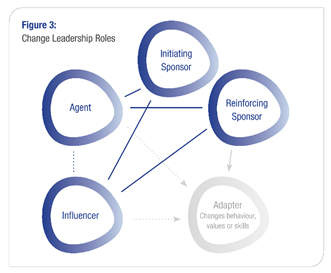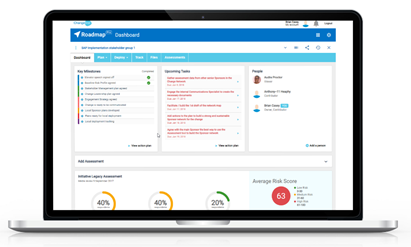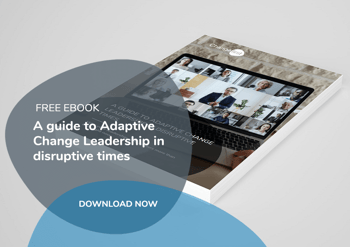As high levels of disruption continue to provide challenges for the way that change is planned, implemented and assessed in organisations, Change Leaders are having to call on all of their experience and capabilities to continue to lead through change.
Adaptive Change Leaders have a style that is particularly well suited to operating right now. So, what are the adaptive Change Management competencies that are helping them to successfully navigate what are fairly turbulent times?
We believe there are 4 as follows and that adaptive Leaders:

1. Are capable of creating an effective context for change and transformation
This is one of the key roles of change leaders.
Unfortunately, as Forbes point out it is also one of the first casualties when there are times of extreme upheaval. As leaders sacrifice the need for vision and replace it with more pragmatic and experimental approaches to setting direction.
However, adaptive change leaders recognise the importance of setting a course – even in times of great change and uncertainty - and also of creating context around change that employees can operate in. With a strong adaptive Change Management definition to work to. They also understand that there are two key aspects to this that both need to be in place to create an environment for successful change – namely vision and imperative for change:
- Vision – is about defining and communicating what change can achieve for the organisation and providing a positive and clear picture of the intended outcomes of change
- Imperative for change – is much more about why things need to change and why the future needs to be different both for individuals and the organisation, and why retaining the status quo isn’t a realistic option. What we tend to find in the data in our research with clients is that leaders tend to underplay the imperative element in change which is problematic – as lack of a clear imperative poses one of the biggest risks to successful change
By clearly defining both of these, adaptive Change Leaders quickly help people to understand the change needed in context. And also get on board with it, because they have a clear understanding of why the company needs to make change at a broad level, for example, to stay competitive and continue to develop as a business. As a result, they are much more likely to get behind any projects or initiatives that are linked directly to it by leaders. And pre-disposed to tailor their efforts and commitment to support what they see as a common goal.
Done properly it also ensures that individuals are not confused by conflicting directions and initiatives that can seriously test their resilience – particularly at times of enormous change.
2. Can energise Change Leadership at different levels in the organisation
Leadership happens best as a cohesive network where individuals bring different elements of power – for example organisational, project expertise and political power – to ensure that change is able to cascade effectively throughout the organisation.
This becomes increasingly important when there is a need to lead through change and teams are disparate and working remotely as many are right now.
It is a topic that we will return to in our next blog, but adaptive Change Leaders recognise that - while setting direction for change at the top is a key determinant of change success - Change Leadership happens at a range of different levels in the organisation and involves a number of different roles including:
- Initiating sponsors – typically have accountability at an executive level for the change and are tasked with authorising, driving and reinforcing the change
- Change agents - have a pivotal role, not only do they need to be effective change leaders themselves but they need to help the initiating sponsor identify and develop a network of sponsors to drive the change

- Reinforcing sponsors – in many changes success is heavily dependent on middle and front line managers being effectively prepared to lead change in their local areas – to drive local deployment plans and to try to engage and support their teams through the change
- Influencers – lack formal authority in the change process but can use informal influence to provide additional legitimacy and support for the change. In fact, in his book the Tipping point, Malcolm Gladwell explains that change stands a much higher chance of being adopted if informal opinion makers in the organisation support it. So, it is crucial that Change Agents can identify advocates, connectors, controllers and experts who can be recruited to help deliver change
Adaptive leaders recognise the importance of energising Change Leaders across this network and focus heavily on this. And understand how adaptive leadership and Change Management go hand in hand.
3. Have the vision to develop adaptive change capacity in the organisation
In fact, they see this as their own personal responsibility and are focused on recruiting and developing fellow leaders at all levels who are ‘change ready’.
Adaptive Change Leaders are laser focused on embedding adaptive change capacity in the DNA of the organisation. By finding and developing the type of fellow leaders that are going to lead through change and thrive rather than flounder during times of disruption.
In practice, this will typically take a range of different forms including:
- Recruitment – tasking recruiters with integrating profiling techniques with prospective candidates that allow the identification of specific characteristics that align with a ‘change ready’ outlook
- Development – offering and embedding programs that help build leader resilience into talent management programs
Their objective is to ensure that the organisation has the building blocks and capability in place to enable widespread change across the organisation.
4. Ensure fellow leaders have the tools to deliver change during disruption
One of the key challenges of the last 12 months or so has been the pressure that has been placed on existing Change Management processes and approaches.
What worked prior to the pandemic doesn’t necessarily work right now - for a whole host of reasons from the increase in teams working remotely, to travel restrictions and restricted access to corporate offices the world over.
A key question for adaptive change leaders in this scenario is – “do my key leaders have the Change Management tools they need to be successful and support me in delivering major change amidst all of the disruption?”
Our work with clients is telling us the answer they are increasingly getting is “no” – and many of them have moved to fix the problem quickly with a focus on a number of key areas as follows:
-
Using assessment tools to gather change data remotely and in real-time – at a time when getting Change Management “boots on the ground” gathering data on the impact of change has been challenging but the ability to gather and assess data remotely is key

- Increasing digital collaboration on change initiatives – a side effect of the pandemic, has been to increase the pace of digital transformation for all businesses and the functions within them. And Change Management has been no different. Increasingly adaptive Change Leaders are adopting digital Change Management platforms that enable geographically dispersed and socially distanced teams to collaborate, plan and track change initiatives
- Boosting skills through virtual learning programs – for key team members including change specialists and change leaders with virtual delivery replacing face-to-face delivery and workshop training
|
Take your first steps to a more adaptive Change Leadership approachIn disruptive times every step is the first step. And for many Changefirst clients first steps are small, “sure starts” based around proven, industry recognised thinking and 25 years’ plus field and academic research. Our dynamic one-day Executive Leader Boot-camp focuses on developing Change Management as a Leadership competency for:
|





Leave a comment